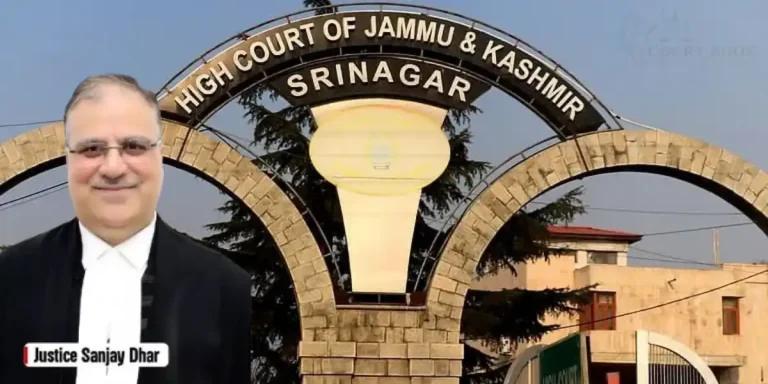The High Court of Jammu & Kashmir and Ladakh at Srinagar has delivered a significant ruling reaffirming the legal presumption attached to revenue records under Section 31 of the Jammu and Kashmir Land Revenue Act. The Court ruled that this presumption cannot be displaced solely on the basis of sworn affidavits.
Justice Sanjay Dhar passed this ruling while allowing a petition challenging an order by the 2nd Additional District Judge, Srinagar, which had previously reversed a trial court’s denial of interim relief and directed parties to maintain status quo on a disputed piece of land.
“Merely swearing an affidavit that they are owners in possession does not dislodge the presumption attached to the entries in Khasra Girdawari,” the Court emphasized.
Read also:- Marriage Declared Void Relates Back to Wedding Date, No Maintenance Payable: Allahabad High Court
The case stemmed from a land dispute in Village Nowgam. The plaintiffs, descendants of Abdul Salam Bhat, claimed ownership and possession over 2 kanals and 8 marlas of land under Survey No. 878. They alleged the land came to Abdul Salam Bhat after a family partition in 1970 and was in continuous cultivation by them since then.
Seeking a declaration of ownership and an injunction, they approached the trial court. Alongside their suit, the plaintiffs also filed for interim relief under Order 39 Rules 1 and 2 of the Civil Procedure Code to restrain the defendants—heirs of Mst. Khati—from interfering with the property.
However, the trial court denied the interim relief. The court noted that the plaintiffs failed to provide any documentary evidence, such as revenue extracts, to prove their possession. On the contrary, the defendants presented certified copies of the Khasra Girdawari (2022) and Jamabandi, showing that the suit land was under the personal cultivation of Mst. Khati, who was also recorded as the owner.
Read also:- Live-In Partner Misuse Case: Delhi HC Imposes ₹20K Fine for False Allegation
The plaintiffs challenged this order in the appellate court, which reversed the trial court’s decision and directed the parties to maintain status quo.
Advocate M. A. Makhdoomi, appearing for the petitioners, argued that the appellate court made a serious jurisdictional mistake. He stressed that affidavits alone could not rebut the legal presumption of correctness under the revenue law.
On the other hand, Senior Advocate N. A. Beigh, assisted by Advocate Mohammad Murshid, defended the appellate order by arguing that the plaintiffs had filed sworn affidavits asserting long-standing possession since the 1970s. They claimed that status quo was necessary to prevent irreparable harm and preserve the lis.
Read also:- Kolhapuri Chappal Controversy: Bombay HC Rejects PIL Against PRADA
Despite these claims, the High Court found the reasoning of the appellate court flawed.
“The learned appellate court, in its anxiety to protect the subject matter of the lis, directed maintenance of status quo... without realising that the plaintiffs had failed to establish a prima facie case in their favour,” the Court noted.
Justice Dhar pointed out that not a single document was produced by the plaintiffs to support their claim of partition or possession. In contrast, the revenue records firmly supported the defendants' version.
“There is a presumption of correctness attached to the entries made in the revenue records in terms of Section 31 of the Land Revenue Act. This presumption... has not been rebutted by the plaintiffs,” the Court stated.
The Court further clarified that interim injunctions are not a matter of right. They depend on establishing a prima facie case, which the plaintiffs had failed to do. Accordingly, it ruled that the trial court had correctly exercised its jurisdiction in refusing the injunction.
“The discretion exercised by the learned trial court is neither arbitrary nor perverse, as such, it was not open to the learned appellate court to interfere,” the Court held.
Concluding that the appellate court had acted beyond its jurisdiction, Justice Dhar invoked Article 227 of the Constitution and quashed the appellate order.
“The appellate court has committed a grave error which has resulted in miscarriage of justice,” the judgment remarked.
Case Title: Mohammad Shafi Bhat & Ors Vs Ghulam Nabi Bhat & Ors.
For Petitioners: Mr. M. A. Makhdoomi
For Respondents: Mr. N. A. Beigh, Sr. Advocate, with Mr. Mohammad Murshid















